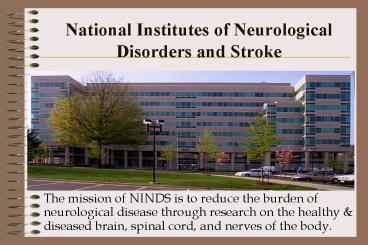National Institutes of Neurological Disorders and Stroke PowerPoint PPT Presentation
1 / 23
Title: National Institutes of Neurological Disorders and Stroke
1
National Institutes of Neurological Disorders and
Stroke
- The mission of NINDS is to reduce the burden of
neurological disease through research on the
healthy diseased brain, spinal cord, and nerves
of the body.
2
NINDS Clusters
Neurogenetics
Systems Cognitive Neuroscience
Channels, Synapses Circuits
Technology Development
Training Career Development
Repair Plasticity
Neurodegeneration
Clinical Trails
Minority Health
Neural Environment
ANDP May 2003
3
NINDS Budget FY2002
4
National Institute of Neurological Disorders and
Stroke Research Training and Career Development
Programs
ANDP May 2003
5
Jointly Sponsored NIH Predoctoral Training
Program in the Neurosciences
Sponsoring Institutes NIA, NICHD, NIDCD, NIDCR,
NIDA, NEI, NIGMS, NIMH, NINDS, NINR Program
Objective To encourage and support broad,
early-stage (pre-thesis) training in the
neurosciences by offering institutions a single
comprehensive training grant. It is expected
that these training programs will contribute to
basic and disease-related neuroscience research
that is relevant to the participating NIH
Institutes.
6
Jointly Sponsored NIH Predoctoral Training
Program in the Neurosciences
FY 2002 FY 2003 (New) Institute Trainees
(T32) Institute Trainees (T32) NINDS 106
(19) NINDS 22 (0) NIMH 58
(7) NIMH 22 (0) NIA 17
(3) NIGMS 6 (0) NICHD 10
(2) NIDA 2 (0) NIDCD 10
(2) Total 52 (0) Others 20
(1) Total 221 (34)
7
Institutional Research Training Programs
Increasing Diversity
Sponsoring Institutes NIMH, NIDA, NINDS Program
Objective To significantly increase the number
of minority scientists trained to conduct
research in mental health, mental illness, drug
abuse and neurological sciences. The intent is
to provide support for national or regional
programs to recruit, train, and retain
underrepresented minorities in outstanding
graduate and postdoctoral programs across the
nation.
8
Institutional Research Training Programs
Increasing Diversity
Program Overview FY 2001 FY 2002
(New) Current Estimated 16 Pre and 4 post
20 Percent Minority Trainees 14.5 New
Estimated Percent Minority Trainees
16.6
9
Research Training and Career Development
Programs Recent Trends Fiscal Years 1996 to 2003
ANDP May 2003
10
NRSA Individual Fellowship ApplicationsFiscal
Years 1996 - 2003
11
NRSA Individual Fellowship New AwardsFiscal
Years 1996 - 2003
12
NRSA Individual Fellowship Success
RatesFiscal Years 1996-2003
13
NRSA Institutional Grant Total TraineesFiscal
Years 1997 - 2003
14
NRSA Individual Fellowships Institutional
Training grants Trainee Numbers FY 2002
F 3 0
T32Pre (Joint Predoc)
T32Pre (Thesis)
F31
T32Post
F32
15
Research Career Development Programs Recent
Trends Fiscal Years 1996 to 2003
ANDP May 2003
16
Research Career Development ApplicationsFiscal
Years 1996 - 2003
17
Research Career Development New AwardsFiscal
Years 1996 - 2003
18
Research Career Development Award Success
Rates Fiscal Years 1996-2003
19
Office of Minority Health and Research
- Predoctoral Fellowship Awards for Minority
Students (F31) - Predoctoral Fellowship Awards for Students With
Disabilities (F31) - Matching Supplements for Institutional National
Research Service Award (T32) - Career Development Award for Minority Scholars in
Neuroscience (K01)
20
Office of Minority Health and Research
- Specialized Neuroscience Research Programs (U54)
- Collaborative Neurological Sciences (CNS) (S11)
- Neuroscience Scholars Program (R25)
- Research Supplements for Underrepresented
Minorities - Research Supplements for Individuals with
Disabilities - Supplements to Promote Reentry into Biomedical
and Behavioral Research Careers
21
Specialized Center Cooperative Agreements (U54)
- Augment and strengthen research capabilities of
faculty, students, and fellows at minority
institutions. Four programmatic goals - Assist researchers in developing state-of-the-art
neuroscience research programs. - Assist researchers in creating more opportunities
for effective and substantial research
collaborations. - Increase and maintain a vigorous and stimulating
academic and intellectual milieu. - Provide support for pilot research needed to show
the skills and abilities of investigators.
22
Collaborative Neurological Sciences (CNS) Award
(S11)
- Support for new research investigations to
strengthen biomedical and behavioral programs at
minority institutions. - Supports research partnerships for faculty to
collaborate with grantees from leading
neuroscience research laboratories. - Enhance the research capabilities of applicants
to obtain independent research funding. - Supports training opportunities for predoc
students and postdoc fellows.
23
Neuroscience Scholars Program (R25)
- Enable grantee organization to provide research
and related experiences for undergrads, graduate
and medical students, postdocs and junior
scientists from underrepresented racial/ethnic
minority groups to broaden their skills. - Funding support for Neuroscience Scholars
Programs should lead to increased recruitment,
mentoring, training and retention of minorities
in the scientific and technology workforce.

